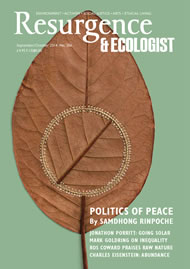When economists start getting compared with rock stars, you know something peculiar is going on. What have the two categories got in common after all, except perhaps their commitment to strange worlds where the rules are not quite the same as they are for ordinary mortals?
The important question is probably not why the media have taken to calling Thomas Piketty the “rock star economist” – which is anyway mildly tongue-in-cheek – but whether the extraordinary reception of his book Capital in the Twenty-First Century, all 700-plus pages of it, really reflects a major shift in thinking.
Piketty is a man of the left, a 43-year-old professor at the Paris School of Economics. He was not a household name until a few months ago – and perhaps he isn’t now – and his book was only published in English this year. What makes him interesting is first, that he dared fly in the face of mainstream economics to talk about equality – a big no-no for the current economic consensus – and second, that he pioneered statistical techniques, along with others, that allowed him to measure it.
And measure it he did, right back to the 18th century in Europe and America, borrowing from the insights of Jane Austen and other great contemporary critics along the way. What he found was that the 1% now take as much as a fifth of all income in the UK and the USA, just as they did before World War I.
This is not really a revelation, even if the statistics are. In the UK, inequality was pinpointed back in 2009 in The Spirit Level, by Richard Wilkinson and Kate Pickett, which took an alternative statistical approach. What the Piketty-Pickett combination suggests is that the postmodern economy seems to have been designed to funnel money upwards to the very rich. It is the precise opposite of trickle-down.
What seems to have turned Piketty into a rock star from a best-selling economist – achieved in May 2014 in New York – was the wholehearted enthusiasm of the doyen of liberal economic commentators, Paul Krugman, writing in The New York Review of Books almost at book length himself.
Piketty certainly has a novel approach to telling the story, but – as one of my colleagues suggested – economics books get rock star coverage not so much when they really say something new (people just ignore that), but when a familiar idea is finally accepted. We applaud loudest when someone laboriously confirms our existing opinions.
That said, of course, the fightback has begun. Chris Giles in the Financial Times suggested that small statistical mistakes undermined the Piketty case. The state of the argument is that Giles’ attack failed, but the argument has barely begun.
“This latest attempt to debunk the notion that we’ve become a vastly more unequal society has itself been debunked,” wrote Krugman, dashing to Piketty’s defence. “And you should have expected that. There are so many independent indicators pointing to sharply rising inequality, from the soaring prices of high-end real estate to the booming markets for luxury goods, that any claim that inequality isn’t rising almost has to be based on faulty data analysis.”
What happens now is that the world will argue, first, over whether it matters, and then over what to do about it. This is where radical economics comes in. My own book, Broke, argued that the way we had organised the financial services industry was simply corrosive of the middle classes, hoovering up wealth and – if it prevents damage to the industry itself – bankrupting its clients. The Lloyds of London scandal in the 1990s showed just how far they would go to protect the financial status quo, and the whole charade was repeated again, on a unimaginably bigger scale, after the 2008 banking crash.
Piketty doesn’t put forward much of a manifesto, beyond the super-Fabian idea of a global wealth tax. It isn’t clear from his book either that he is much aware of the challenges of global warming or the potential redistributive power of local energy. Or that he has much to say by way of a solution, beyond the usual business of redistribution using a new tax system.
So while the statistics are important, I have a feeling that the debate is moving on. Not only is the planet now crucial to the economy, but also taxing people is not the obvious solution – the wealthy simply avoid it. The truth about income tax is that for the mega-rich it is now almost a voluntary contribution.
It is possible to imagine other kinds of tax that are not avoidable in quite the same way – on resource usage, or fossil fuels. But the next agenda for policymakers is at least a little clearer, if they dare: it is to make sure that the rewards of business and investment get distributed more fairly in the first place, so that they don’t have to be redistributed later by cumbersome bureaucracies.
I find myself harking back, not so much to Keynes as to G.K. Chesterton and the Distributists in the 1920s, and not so much for their answers as for the way they framed the questions.
How can we provide people with the basic assets they need without having to beg for them, apply for them or compete for them – via a place and a small plot of land to underpin their lives? Where are we heading if we have no underpinning? Is there any possible end to the story of the new Belle Époque, as Piketty calls it, except a kind of indebted slavery, locked into a vast, efficient machine? And finally, what is the purpose of the economy, and is ours at all fit for purpose?
What Piketty has done is to track the history of this inequality back two centuries. What we have to do is shape a system that puts the great vacuum cleaner mechanism into reverse.







